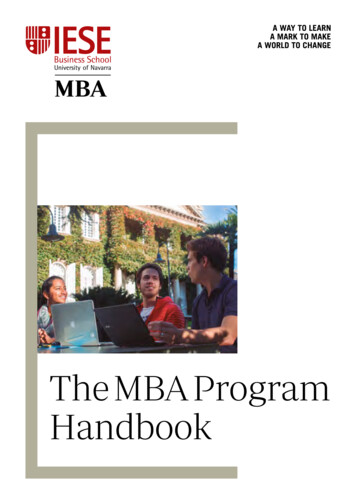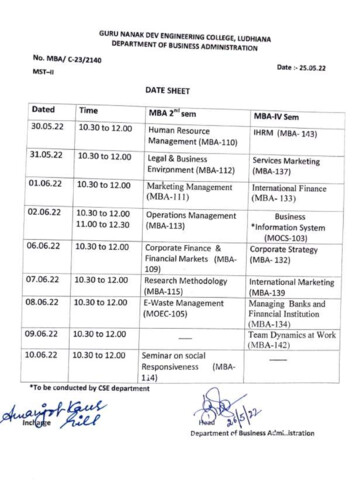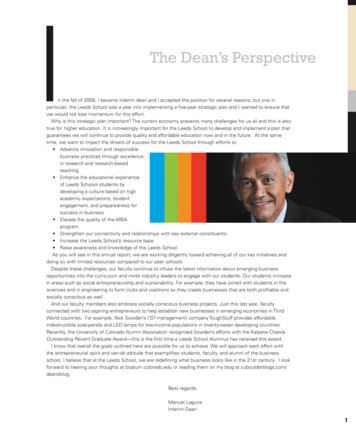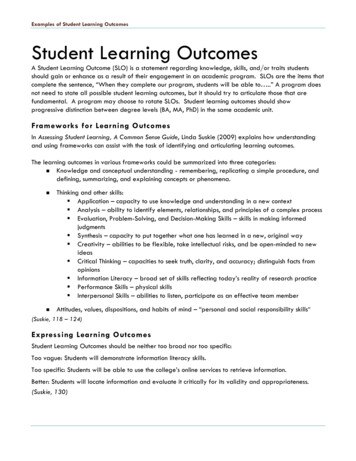
Transcription
The MBA ProgramHandbook
Contentsp. 4MBA Mission, Values and Objectivesp. 5MBA Program StructureFirst YearTerm Structure and CoursesThe Capstone ProjectSummer InternshipSummer Entrepreneurship ExperienceSecond YearBidding for ElectivesInternational ElectivesIndependent Study ProjectInternational Exchange ProgramOutgoing StudentsIncoming StudentsLearning Spanish and the Bilingual MBAp. 9Administrative StructureThe MBA CommitteeTeamwork, Team Mentors and FacilitatorsCommunication with Professorsp. 10MBA Program RulesClass attendanceFood and drinkDress CodeVisitorsExamination BehaviorPlagarismHarassmentGradingp. 13Student ServicesHealth InsuranceOn-Campus ServicesIT Student ServicesOther IT Servicesp. 16Financial Mattersp. 17Student LeadershipStudent CouncilProfessional Club LeadershipClass PresidentMBA AwardsAcademic RequirementsAcademic EvaluationProcessAppealsLeave of AbsenceStudent VisasIESE’s ImagePhoto Rights
MBA Mission, Valuesand ObjectivesThe IESE MBA is a two-year leadership development program.In line with IESE’s mission, the MBA Program serves todevelop leaders who can have a positive impact through theirprofessionalism, integrity and spirit of service.MBA ValuesIESE MBA students are a very diversegroup of people and each studentbrings his/her own values to theprogram. However, we all share a set ofcommon values:·· Always act with Integrity·· Have deep Respect for one another·· Work with a Spirit of Service towardsthe others·· Put in Hard Work towards achievingyour goals·· Work to a high level of ProfessionalismIESE MBA BehaviorsIESE Business SchoolThe IESE MBA learning environmentextends beyond the classroom andincludes the many ways in whichstudents, staff, faculty and alumniinteract on and off the IESE premises.4We strive to create a positive,respectful atmosphere that fosterslearning and in which all membersof the IESE MBA community canachieve their highest potential.IESE MBA students are expected toexhibit the MBA values, among others,through the following behavior:Integrity: MBA students arehonest and abide by the rules.Their word is their bond.Respect: MBA students respecteverybody around them and show thisthrough polite behavior, regardlessof gender, sexual orientation, race,religion or any other factor irrelevantto participation in the MBA.Spirit of Service: MBA studentssupport their classmates in every waythey can. They take responsibilityfor running student activities and getinvolved in the wider IESE community.Hard Work: MBA students believe inthe value of working hard to achievetheir goals and therefore do notlook for shortcuts or quick fixes.Professionalism: MBA studentscome to class prepared anddress according to the occasion.They are punctual and meet theirdeadlines. They are committed toproducing the best work they can.It is the responsibility of everyindividual member of the IESEcommunity (MBA students, facultyand staff) to ensure that these valuesare upheld at all times and to dealwith any inappropriate behavior.Objectives ofthe MBA ProgramThe MBA degree is awarded to studentswho have the knowledge, skills, attitudesand personal qualities necessary toserve as a foundation on which tobuild a solid career as a manager.This means that candidates mustprogress in the following three areas:·· Knowledge about management, i.e.,functional areas such as finance,accounting, marketing, leadershipand ethics, supply chain managementand other functional areas required todo the work of a manager. Managersmust know about their job.·· The skills needed to performmanagerial tasks, i.e., teamwork,communication, open-mindedness,etc., that enable a managerto put acquired knowledgeinto practice. Managers mustknow how to do their job.·· Personal qualities, such asprofessionalism, cultural awareness,maturity and motivation, combinedwith a high sense of responsibility,honesty and a desire to serve others.Managers must have integrity.
MBA ProgramStructureThe IESE MBA is a 19-month program organized in two academic years.During the First Year, all students follow the same curriculum. Bycontrast, the Second Year is made up entirely of elective courses thatstudents select through a bidding process. Some electives are offered atinternational locations in an intensive format.The First YearThe First Year starts with OrientationWeek in September. The purposeof Orientation Week is to familiarizestudents with the program, the casemethod, the class, and the faculty andstaff of the MBA. Orientation Weekincludes classes, team activities,lectures and Career Services activities.Term Structure and CoursesThere are three terms in the First Year.Each term has the following courses:1ST TERM2ND TERM3RD TERMAnalysis of Business ProblemsLeading OrganizationsCompetitive StrategyCapital MarketsManagerial AccountingCorporate FinanceCommunicationManaging OneselfDecision AnalysisMarketing, Planning andFundamentals of EntrepreneurialManagementFinancial AccountingImplementationLeadershipOperational FinaznceMarketing ManagementOperations ManagementTeambuilding ITeambuilding IIGlobal EconomicsOperations StrategyQuantitative Methods for ManagementTeambuilding IIIBesides academic activity, each termalso includes relevant sessions fromCareer Services to support studentcareer development and applications forboth summer internship opportunitiesand full-time jobs after graduation.Team activities, professional clubactivities and international trekscomplete the term schedule.Transforming Organizations andMarkets with ICTsThe MBA Program HandbookGlobalization of Business Enterprise5
The Capstone Project(8 ECTS credits)The Capstone Project is an integrativeassignment designed to draw on allthe learning acquired during the FirstYear of the MBA. Students are givena real business challenge and haveto do research and conduct meetingswith clients, employees and suppliersin order to respond to it. Based on theinformation gathered, students workon a final proposal for the company.Some of the challenges tackled inprevious years have included designinga product launch, a new marketentrance, a social media strategy and asuccession plan for a family business.In the first stage, an IESE facultymember will work with organizationsto identify and define a suitablebusiness problem. In the next stage,the company will make a presentationto five MBA teams. Students thenhave a period of time to research theorganization, the market, etc., andarticulate their course of action.MBA teams work under the supervisionof the faculty member responsiblefor the particular company project.IESE Business SchoolThe Capstone Project takesplace during the third term.6Summer InternshipHalfway through the MBA, duringthe summer break, students doan internship, where they applythe classroom knowledge in theworkplace. The summer internshiplasts around eight weeks andaccounts for 12 ECTS credits.Students have different optionsfor their summer internship:1. Corporate internship in localor international companies. It is afantastic opportunity for studentsto gain insight into new businessareas, firms and regions.2. Summer Entrepreneurial ExperienceIESE MBA students have the optionof working on an entrepreneurialventure during their summer break.Supervised by an IESE faculty member,students work in teams to explore anentrepreneurial opportunity and moveit to the next stage. Access to thisprogram is granted after an applicationprocess, the conditions of which areannounced during the second term.
Bidding for ElectivesIn the Second Year of the program,students are given the opportunityto select the subjects they are mostinterested in. In order to process courseallocation efficiently and fairly, IESEuses an online bidding system thatconsists of two stages:CHOOSE Program: Students state theircourse preferences by ranking anddistributing 100 points among them.The results of this first round aretentative and make it possible to gaugestudent interest. Courses that attractfewer than 25 students maybe canceled.CHANGE Program: Students can requestto change/add/drop courses allocated tothem in the previous stage.Bidding for fourth-term coursestakes place in May of the previousacademic year.Bidding for fifth-term courses startsin mid-November of the SecondAcademic Year.Students are required to take aminimum of 5 credits per term,4 of which should be held on Barcelonacampus. They can add an extra creditto their workload if they wish. Auditingcourses is not allowed.International ElectivesThe MBA Program currently offerselectives at the following locations:TERM 4· New York· Sao PauloTERM 5· Nairobi· ShanghaiInternational electives are included in thebidding process for terms 4 and 5. Eachweek, two half-credit courses are offered.During these overseas modules, studentscan take up to four half-credit courses,including company visits and networkingevents that provide direct insight intobusiness practices in each of theseimportant locations.The Nairobi and Sao Paulo modulesoffer in-company projects during thesecond week. Students choosing to workon these projects actually start theirresearch at least a month before travelingto their destination and continue workingafter their return to Barcelona.Independent Study ProjectThe Independent Study Project (ISP)enables IESE MBA students to focuson a particular area of study that is notavailable as an elective course. Students(individually or in teams) explore a topicin depth under the supervision of anIESE faculty member. Students can applyfor one ISP per term. Depending on theestimated workload, the faculty membersupervising the project will decide if theISP is worth ½ or 1 credit.Examples of recent ISPs includecreating a search fund business planand industry studies. IndependentStudy Projects need to be approved inwriting by the Academic Director of theSecond Year.International ExchangeProgramOutgoing StudentsIESE Business School partners withsome of the world’s top businessschools in more than 10 countries toenable students to participate in theInternational Exchange Program.Around 90 places are available for IESEBusiness School students to study forone term in the Second Year at one ofour exchange partner schools. Allocationof exchange places is done using abidding process that is based on the GPAobtained from the courses in the first andsecond terms of the First Academic Year.Students wishing to go on exchangeneed to earn a GPA of at least 2.8.Please note that, according to the U.S.Department of Education, students whoare U.S. citizens and decide to takeout U.S. Federal Direct Loans are noteligible to go on an exchange in theUnited States or at a school outside theUnited States that does not participate inthe Federal Student Loan Program. Theschools currently participating in thisprogram are London Business School,HEC School of Management, MelbourneBusiness School and Recanati Schoolof Business Administration at theUniversity of Tel Aviv. More informationis available on the U.S. Department ofEducation’s website. If you have morequestions, do not hesitate to contact theFinancial Aid Office.Incoming StudentsEvery year, IESE welcomes more than85 students from 30 different businessschools from all over the world.The MBA Program HandbookSecond YearThese students become full-time IESEstudents fot one term in the Second Year.7
Learning Spanish andthe Bilingual MBAThe Business Spanish Program isspecifically designed for IESE MBAstudents. Its objective is to ensure thatparticipants can fluently engage invarious business situations with specialemphasis on verbal communication.The program is designed based on thecriteria established by the Council ofEurope’s Common European Frameworkof Reference for Languages (CEFR).For First-Year MBA students, Spanishinstruction begins in August withintensive classes. The program is opento students with no previous Spanishlanguage knowledge and to thosewith an advanced level. It is offeredthroughout the MBA Program with aduration that depends on each student’slevel. In the first academic year,students who wish to attend Spanishclasses do so three times a week. In theSecond Year, students may join groupsof First-Year or Second-Year students,depending on their level.IESE Business SchoolThroughout the First Year, studentshave the opportunity to take a Spanishlanguage level test (Diploma en Españolde Negocios). Passing the test enablesstudents to earn the Bilingual MBADegree and take electives taught inSpanish during the Second Year.8The Business Spanish Program alsowelcomes students’ partners whoare eager to learn Spanish. IESEoffers special tuition fees for partnersinterested in enrolling in this program.
AdministrativeStructureThe MBA Director has a Committee that helps him direct the MBA Program. TheCommittee is composed of the MBA Director, the Academic Director for the FirstYear, the Academic Director for the Second Year, the Executive Director of the MBAand the Heads of Section.The members of the MBA Committee for the 2016-2017academic year are:DIRECTORProfessor Carlos García PontACADEMIC DIRECTORMBA-IProfessor MarcBadiaACADEMIC DIRECTORMBA-IIProfessor GaizkaOrmazabalCURRICULUMDEVELOPMENTProfessor Julia PratsEXECUTIVE DIRECTORHead of Section EMarta EscardóASSOCIATE DIRECTORHead of SectionsC&DAmalia ColomASSOCIATE DIRECTORHead of SectionsA&BCecilia KindelánThe Executive Director is responsible for all non-academic issues. The Heads ofSection are responsible for ensuring that the program runs smoothly within theirsections. They hold periodic meetings with team mentors and faculty members intheir areas to monitor progress and receive suggestions.Teamwork, TeamMentors and FacilitatorsDuring the First Year, each student isassigned to a team. That team meetsdaily to discuss the day’s cases andwork on projects. Teams are assembledto ensure professional, cultural andlinguistic diversity. Regular, punctualattendance at team meetings is anoverriding obligation, part of the levelof professionalism expected and anessential requirement for achievingthe MBA Program objectives. It is theteam’s responsibility to ensure that itfunctions as a cohesive unit with allstudents contributing in a mutuallysupportive environment.Each team is assigned a team mentor.The team mentor is a member of theIESE faculty and/ or management. Therole of the team mentor is to monitorthe progress of team members indeveloping the attributes mentionedabove and to advise students on how toget the most out of the program.Each team is also assigned a facilitator.The facilitator is a Second-Year studentwho volunteers to help a First-Year teamduring the first weeks of the program.The facilitator shares teamwork bestpractices with the assigned team,provides useful information and servesas a link to Second-Year students.Communicationwith ProfessorsTo achieve the program’s objectives,there must be an unrestricted flow ofcommunication between students andfaculty members. It is the students’responsibility to speak directly withtheir professors to clarify concepts,discuss their academic performanceand seek advice.The MBA Program HandbookThe MBA Committee9
MBA Program RulesClass AttendanceDress CodeClass attendance is compulsoryand recorded daily. In the case ofunavoidable absences, students need toinform the professor and the MBA Officein writing. It is the student’s responsibilityto make up any missed work.The appropriate dress code for classis business casual. When more formalattire is required, students will beinformed in advance.Any student who accumulates 20%absences in any given course willautomatically receive an Incomplete forthat course, regardless of the academicgrade awarded by the course professor.If a student has accumulated two ormore Incompletes in one term or threeor more Incompletes in the First Year,an Academic Evaluation Process maybe opened. This Process can also beinitiated when a student misses morethan 15% of classes in a given term.It is the responsibility of the MBACommittee (not the course professor)to evaluate each Incomplete. TheCommittee can ask any student withan Incomplete grade to do remedialwork or attend specific courses in theSecond Year. Failure to complete theremedial work or follow the Committee’sinstructions automatically triggers anAcademic Evaluation Process.IESE Business SchoolStudents who arrive to class late (i.e.,after class attendance has been taken)will not be allowed into class.10Food And DrinkWe understand that some studentsmay be surprised by this rule, but onlywater is allowed into the classroomat IESE Business School. Studentsare discouraged from entering theclassroom with hot drinks and/or food atany time, including during class breaks.VisitorsVisitors are not allowed in class. OnlyMBA candidates involved in a formaladmissions process with the AdmissionsDepartment may be invited to attenda class. Friends, spouses and otherfamily members may be invited to socialactivities but not to attend a class.Examination BehaviorStudents must take all examinationsrequired for each course, as theyare an integral part of the program.Examinations are conducted accordingto the following standards:·· Communicating between studentsduring exams is forbidden, as iscollaboration with other studentson written exams unless otherwiseindicated by the professor.·· Books, laptops, phones and anyother support tool are not allowed inexams unless otherwise indicatedby the professor and then onlywithin the limits set by him/her.·· Should a student wish to quotecontent from materials that are notself-originated, he or she must citethe source clearly. Otherwise, itmay be considered plagiarism. Thisapplies to textbooks, periodicals andother published sources, as well asarticles posted on the Internet.Failure to comply with these rulesamounts to dishonesty and is unfairto other students. It will therefore beconsidered serious misconduct and willresult in the opening of an AcademicEvaluation Process, which may lead to thestudent being asked to leave the program.Students must take all examinations at thescheduled time. Students arriving late toan exam will not be allowed to enter.Final exams may be rescheduledwith advance permission from theExecutive Director only in exceptionalcircumstances such as incapacitatingillness and serious family emergency.Travel arrangements, mild illness,interviews and the like are not acceptablereasons for changing an exam time.If there is a need to change the dateor time of an exam, the student shouldcontact the Executive Director beforethe scheduled exam begins. In caseof illness, the student will be requiredto provide written confirmation from ahealthcare professional. An alternativeexam date will be scheduled by theExecutive Director in consultation withthe professor. As a matter of policy, thereis no rescheduling of midterm exams.PlagiarismIn academic writing, taking someoneelse’s ideas or words without adequatelycrediting that source in your paper isconsidered plagiarism. It doesn’t matterif the source is a published author,another student, a website withoutclear authorship, a website that sellsacademic papers or any other person:taking credit for anyone else’s work isstealing and it is unacceptable in allacademic situations, whether you do itintentionally or by accident.Students who submit work that is nottheir own or without clear attributionto original sources will be subject todisciplinary action. Punishment forplagiarism may include expulsion fromthe MBA Program.HarassmentIESE Business School is committedto offering an environment in whichstudents, faculty and staff can work
This culture of respect for others canonly be preserved if all students makeit their own and are willing to deal withany violations.GradingFirst Year: At the end of each course,professors give each student a graderanging from A to C:·· A’s are given to students who performin the upper 15% of the class in theFirst Year. Professors may decreasethis percentage if they considerit appropriate after consultationwith the MBA Committee.·· C’s are given to students who perform inthe lower 10% of the class. Professorsmay increase this percentage ifthey consider it appropriate afterconsultation with the MBA Committee.·· B’s are given to students who havenot received either an A or a C.Professors, at their discretion, mayaward the grades B and B- toindicate that a student has completedthe course in the upper or lowerrange of the B’s, respectively.Second Year: During the Second Year,A’s are given to students in the top 20%of the class and C’s are given to those inthe lower 10% of the class. Professors,at their discretion, may award the gradesB and B- to indicate that a student hascompleted the course in the upper orlower range of the B’s, respectively.Academic RequirementsFirst Year: Students who receive threeor more credit-equivalent C’s in anygiven term will be placed on probationand warned about their poor academicperformance. An accumulation of 6credit-equivalent C’s during the First Yearmay lead to dismissal from the program.Corporate Internship: Non-fulfillmentof Corporate Internship contractsand serious misconduct affecting theprofessional relation will trigger anAcademic Evaluation Process.Second Year: Students who receivethree or more credit-equivalent C’sin any given term will be placed onprobation and warned about their pooracademic performance. When thishappens in the last term of the SecondYear, the student may be asked torepeat the term and will therefore notgraduate with his or her class.Academic EvaluationProcessAn Academic Evaluation Process (AEP)can be opened by the MBA Committeeat any time due to a student’sunsatisfactory academic performance,absenteeism or serious misconductwith respect to the program valuesand policies. If an AEP is opened,the student is immediately informedin writing and told why the AEP wasopened. As part of the process, thestudent has the right to explain his orher point of view on the issue.In cases of unsatisfactory academicperformance and Incompletes, the MBACommittee may ask the student to takea comprehensive examination at theend of the First Year. The examinationdate is published in the Academic YearCalendar and the examination takesplace on campus one week after thethird-term final exams.If the MBA Committee stipulates thatstudents must take an exam, but fail todo so, they may be dismissed from theprogram.When conducting an AEP, the MBACommittee will take into account thestudent’s academic record and theopinions of the student’s mentor andsection head. The reasons behind theabsences leading to the Incomplete willalso be considered. Additional membersmay join the MBA Committee fordeliberation as required.In cases of serious misconduct and aspart of the AEP, the MBA Committeewill ask the student to explain thecircumstances of the perceivedmisconduct. Failure to do so may leadto a recommendation that the studentshould leave the program.The AEP may conclude with anunconditional or a conditionalcontinuation of the student in theprogram, or with a recommendation tothe IESE Executive Committee that thestudent should leave the program. TheAEP result is communicated in writingto the student.AppealsAny student who is subject to an AEPor has been dismissed for academicreasons may appeal the decision bypetitioning the MBA Committee. Studentsare entitled to one appeal duringtheir tenure at IESE. If reinstatementis granted but the conditions are notsatisfied within a specified period of time,dismissal is automatic and not open tofurther appeal.Appeals should be made within threedays of receipt of the MBA Committee’sdecision and sent in writing to theMBA Office.The MBA Program Handbooktogether with respect and a spirit ofservice. This means that every memberof the community must be respectedand treated civilly, regardless of sex,sexual orientation, race, religion or anyother factor irrelevant to participation inthe MBA. Any student who sees behaviorthat is unbecoming and violates thisprinciple should report it to any schoolofficial or faculty or staff members.The appeal should be made to theAssociate Dean for MBA Programs atIESE, who will issue a decision in writing.11
Leave of AbsenceIf a student needs to interrupt the normaltwo-year course of study, he or she mustrequest a leave of absence in writingto the Executive Director of the MBAindicating the reason for the request andthe length of the anticipated absence.Depending on the circumstances, a leaveof absence may be granted for up to twoyears. Leaves of absence are only grantedto students with a good academic record.Student VisasIt is students’ responsibility to ensurethat they have the legal right to studyin Spain. While the MBA Office willdo all it can to facilitate the process,each student is responsible for fulfillingSpanish immigration requirements.IESE’S imageAll sessions taught by IESE facultymembers or given by speakers within anyof the IESE programs and events are theproperty of IESE Business School. Videoand audio recording and taking photosat any IESE sessions are not allowedunless expressly authorized by IESE foracademic, marketing or media purposes.IESE Business SchoolPrior approval from the MBA Committeeis required to publish any material ona website or any other media in whichIESE’s brand or image is displayed.12Photo RightsIESE Business School reserves the right touse photos taken during class, programsand events for promotional purposes.Students who do not wish to have theirphoto used in promotional materialsshould submit a written statement to theMBA Office.
Student ServicesOn Campus ServicesA comprehensive health insurancepolicy with service provider AXA (www.axa.com) is included in the tuition feepaid by each student. It comes intoeffect two weeks before classes startand is valid until May 31 of the year inwhich the student graduates.At the beginning of the MBA, studentsreceive their IESE Student Card. Thiscard provides access to the followingservices:The policy covers a wide range ofservices, including medical consultation,hospital stays, surgery, pregnancyand birth, pediatrics and gynecology.Healthcare in Spain is provided at theclinics and by the doctors included inthe AXA Medical network and througha reimbursement system for doctorsoutside the network. The insurancepolicy has a reimbursement system forinternational coverage.The same cover is available forstudents’ partners and children who arealso residing in Spain. This cover policyis optional and payable by the student.A list of doctors who speak languagesother than Spanish is available forstudents on the Virtual Campus.Cafeteria:Your IESE MBA card works as a cashcard to pay for drinks and meals at theIESE cafeteria, selfservice cafeteria andNorth Campus restaurant. To use thecard, you need to make a cash depositat the cafeteria.Access to the Campus:You can access the IESE campus from7 a.m. to 2 a.m. daily. You must bringyour Student Card to identify yourselfwith Security.Workrooms:There are many workrooms equippedwith PCs with microphone and camerathat are available all over the IESEcampuses. Students can access thesePCs by using their IESE username andpassword.Self Service Cafeteria: 8 a.m. - 10:30a.m. for breakfast / 12:15 – 3 p.m. forlunch, Monday to Friday.Students can book workrooms bylogging into their email account(mail.iese.net) or through the OnlineBooking System in Virtual Campus.In order to maximize availability for allstudents, the following rules apply:Printing, Copying And ScanningDocuments:·· Reservations last a maximumof 2 hours.Our IESE card gives you access to themultifunction printers (for photocopying,printing and scanning documents) youwill find on every floor of the F-Buildingand in the Library (G-100). A quick userguide can be found next to the printers.·· Each student can book up to 3 roomsper week.South Campus Cafeteria Opening hours:8 a.m. – 8 p.m. Monday to FridayYou can also print from your mobiledevices by sendig an email to print@iese.edu or accesing the website print.iese.edu from your web browser.All printing and photocopying will becharged as follows:Black & white copy 0,042 per pageColor copy 0,23 per pageDocument scanningfree of charge·· Reservations can be requested noearlier than 7 days in advance.Parking:Your card also entitles you to thediscount rate of 6/day at the NorthCampus car park. After 11 p.m., thereis an overnight stay supplement of 6.You may park your car on weekendsafter informing Security.Library:The Student Card is necessary toborrow books from the Library.During the academic year, the Library isopen from Monday to Friday, 8 a.m. to9 p.m. On the weekends before exams,the library is open from 9 a.m. to 8 p.m.The Library is closed on public holidays,Christmas and Easter.The MBA Program HandbookHealth InsuranceSummer opening hours:July - Monday to Friday 8 a.m. to 3 p.m.August - Monday to Friday 9 a.m.to 2 p.m.13
Lockers:A number of lockers is available for youruse at a cost of 0,50/day being thefirst five hours free of charge. They arelocated in the G-Building, just beforereaching the Library (G-100).You need your Student Card to renta locker. Instructions and charges forusing the lockers are posted on theVirtual Campus.Lost And Found:Any lost property will be takento Security.IESE Business SchoolLost Student Cards must be reportedto the MBA Office by email. The costof issuing a new card is 6 payable bythe student upon receipt in the SouthCampus Cafeteria.IT Student ServicesIESE E-Mail Account:IESE provides students with an IESE IDfor life. IESE uses the Microsoft Office365 platform and each account has a50 GB capacity. Students can accesstheir account from any Internet browseron computers and mobile devices.Instructions on how to configure theIESE email account can be found in theIT Support area of the Virtual Campus.OFFICE 365 ProPlusIESE provides students with a licensedOffice 365 ProPlus package (Word,Excel, PowerPoint, Outlook, etc.).This license will be valid during thewhole program until the graduation.I
The IESE MBA is a two-year leadership development program. In line with IESE's mission, the MBA Program serves to develop leaders who can have a positive impact through their professionalism, integrity and spirit of service. MBA Mission, Values and Objectives MBA Values IESE MBA students are a very diverse group of people and each student










